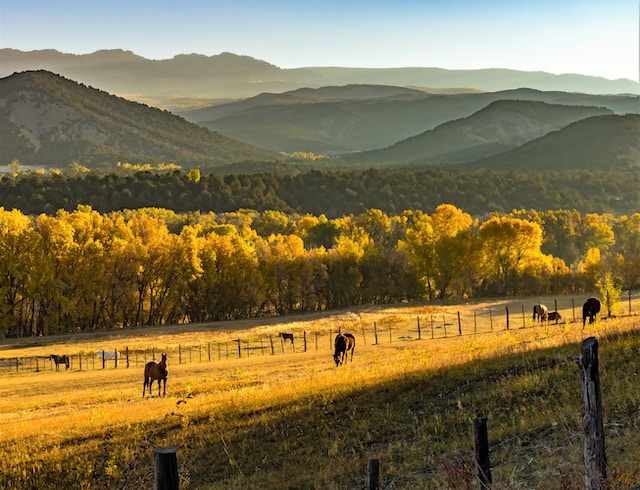Whether you work in citrus groves in southern Florida or run a cattle ranch, comprehensive farm and ranch insurance can help you safeguard your livelihood. It provides liability protection, covers your buildings and structures, and reimburses you for increases in living expenses caused by damage to your property from a covered peril.
Coverage for Your Property
In most cases, ranch insurance is a package policy similar to a commercial business owner’s policy, including property and liability coverages specifically tailored for a farm or ranch. It often also allows you to add a variety of optional coverages, like excess liability protection, equipment breakdown, and identity fraud expense coverage.
The property portion of a ranch insurance plan covers everything from the home on your farm to barns, machine sheds, garages and other structures that house livestock and equipment. This typically also protects the contents of your residence, including furniture, appliances and personal belongings.
A ranch insurance plan can help you manage risks not covered by your homeowners or other policies, including severe weather events and supply chain disruptions that threaten your livelihood. It can also protect your financial losses from theft, damage and destruction. It can even provide a safety net to help pay for business expenses if you temporarily close your ranch due to a catastrophe.
Coverage for Your Livestock
A liability claim can devastate a farm or even force it to close, so a ranch policy must include agribusiness general liability and excess liability coverage. In addition, farm and ranch owners need to safeguard their financial investment in crops, livestock, structures and other business-related items with crop, livestock, foreign object ingestion and equipment breakdown coverage.
Accidents can happen to your herd, so a good agribusiness policy should include livestock coverage for loading and unloading in transit, electrocution and other perils that affect the livestock. It should also have animal care and protection, which can be used to pay for veterinary services or to compensate you if your livestock is lost, stolen or destroyed.
While you may consider your farm or ranch a small business, offering apple picking or hay rides can be commercial. Your standard homeowner’s policy could exclude it. Your ranch insurance agent can help you create a policy with a blanket or scheduled livestock and property coverage that offers the best protection for your unique situation.
Coverage for Your Equipment
When you’re a farmer or rancher, equipment is your lifeblood. Whether a tree rips off your tractor or your invaluable irrigation system goes down during harvest, having the right farm and ranch insurance is essential. Farm and ranch insurance typically includes a specific part for machinery and equipment coverage that can help pay for repairs or replacements. For high-value or irreplaceable property, a farm and ranch policy can also include optional floater insurance to increase the limits on a specific item.
A farm and ranch policy can also cover liability for a farming or ranching business owner. Suppose someone is injured on your property, or you cause damage to a neighbor’s property by accident (like accidentally spraying a pesticide on their crops). In that case, liability insurance can cover legal expenses and any settlements or judgments awarded against you. This type of protection is important for farmers and ranchers who offer agritourism activities like corn mazes or horseback riding.
Coverage for Your Liability
As a farm owner, you have a variety of liabilities that could affect your operations. In addition to general liability coverage, ranch insurance may also include property damage coverage to protect your investment in the buildings on your property, like hay barns, garages for tractors and equipment, chicken and hog houses, and storage sheds.
Many farms, orchards, vineyards and equine operations may think their business needs to be bigger to warrant a separate farm insurance policy. Still, the reality is, they can be exposed to risks that homeowners’ policies can’t cover. For instance, if you sell jam at a farmers market and your batch gets someone sick or a horseback rider is injured on your property, your homeowner’s insurance wouldn’t cover it. A ranch insurance policy can protect against these risks and more.

